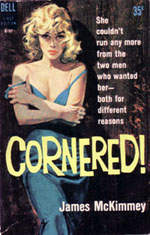- Welcome
- Noir Zine
- Allan Guthrie
- Books
"...those who enjoy the darker side of the genre are in for some serious thrills with this..."
Laura Wilson, The Guardian

Published in the UK by Polygon (March 19th, '09) and in the US by Houghton Mifflin Harcourt (Nov '09).
James mckimmey: the man who alarmed john d. macdonald (updated)
by Allan Guthrie
 James McKimmey (pictured, right) was born in 1923 in Holdrege, Nebraska. He studied architecture at the university of Nebraska, but his studies were interrupted when World War II came along. He served with the 102nd Infantry Division of the US Army for three years. On demobilisation, he decided he wanted to study writing. He attended the universities of Indiana and the American University at Biarritz in France before graduating from San Francisco University with a Bachelor of Science degree in English.
James McKimmey (pictured, right) was born in 1923 in Holdrege, Nebraska. He studied architecture at the university of Nebraska, but his studies were interrupted when World War II came along. He served with the 102nd Infantry Division of the US Army for three years. On demobilisation, he decided he wanted to study writing. He attended the universities of Indiana and the American University at Biarritz in France before graduating from San Francisco University with a Bachelor of Science degree in English.
While holding down various jobs (insurance salesman, clothes salesman, industrial chemicals salesman, expediter in an electronics plant), he wrote.
 Dell published his first novel The Perfect Victim in 1958. Set in Willow Creek, "a hot, dusty little Midwest farm town that looked about as lively as a Baptist church on Monday morning", Al Jackson arrives in town and soon finds himself in jail, accused of rape and murder. McKimmey was to write many times about small Midwest towns.
Dell published his first novel The Perfect Victim in 1958. Set in Willow Creek, "a hot, dusty little Midwest farm town that looked about as lively as a Baptist church on Monday morning", Al Jackson arrives in town and soon finds himself in jail, accused of rape and murder. McKimmey was to write many times about small Midwest towns.
The publication of his first novel allowed McKimmey to write full time. Winner Take All followed in '59. In '60 Monarch published The Satyr and Dell published Cornered!. Over the next few years McKimmey wrote Run If You’re Guilty, 24 Hours To Kill, The Wrong Ones, The Long Ride, Squeeze Play, Blue Mascara Tears. His productivity waned after A Circle In The Water (1965), his next novel, The Hot Fire, appearing in 1968.
His last crime novel (so far!) was The Man With The Gloved Hand (1972).
He has lived much of his life in Lake Tahoe in the Sierra Nevada Mountains with his wife Marty, who died in 1994. McKimmey then married Starr and lives with her in South Lake Tahoe, where he has resided now for 42 years. He celebrated his 80th birthday on September 5th 2003.
Fellow crime writer and one of the greatest storytellers of all time John D. MacDonald acknowledged McKimmey’s talent, stating, "This man can manipulate tension…in ways that are beginning to alarm me."
So, just how does McKimmey manipulate tension? Here is his recipe for RUN IF YOU’RE GUILTY (1963).
KEEP SOMETHING BACK
 A young woman, still luxuriating in post-coital bliss, is enjoying a solitary late-night stroll in the woods. Back in her cabin, her young husband is asleep. When she spots a raccoon, she is alarmed by its aggression until she realises the animal is simply protecting its children. The young woman’s fears dissolve as she identifies with the raccoon. Before long she is laughing "with delight", contemplating motherhood, wondering "if she had become pregnant tonight."
A young woman, still luxuriating in post-coital bliss, is enjoying a solitary late-night stroll in the woods. Back in her cabin, her young husband is asleep. When she spots a raccoon, she is alarmed by its aggression until she realises the animal is simply protecting its children. The young woman’s fears dissolve as she identifies with the raccoon. Before long she is laughing "with delight", contemplating motherhood, wondering "if she had become pregnant tonight."
That’s when she steps in a trap. "The steel whipped and hit hard into her ankle." After dragging the trap a dozen feet, "heart pumping wildly," the trap snags in thick brush. She loses consciousness. "Blackness washed over her mind, like a shade pulled swiftly over light."
The opening sequence demonstrates one of the many techniques McKimmey uses to create tension: he withholds information from the reader, forcing the reader to ask questions (who is the girl, is she okay, will she be discovered soon?). Until satisfactory answers to those questions are given, the reader remains agitated, anxious to know, tense.
ISOLATE YOUR CHARACTERS
Like many of McKimmey’s novels, Run If You’re Guilty doesn’t have a clear protagonist. The author frequently switches perspective (point of view) between his characters. Although he may not be a stereotypical protagonist, Joe Beacon is the novel’s pivotal character.
Joe Beacon lives on the edge of an isolated lake somewhere (unspecified) in Southern California. At the foot of a cliff, a "white board sign…in neat black stencilling" reads, "JOE’S RETREAT – Fishing – Boating – Cabins." True to his name, he is a beacon for weary travellers.
Hemmed in by water and woodland, there is only one road into the cabin site. Escape, were the road to be blocked, would be almost impossible.
ESTABLISH AN INTERNAL CONFLICT
Like the majority of McKimmey’s characters, Joe faces an internal struggle.
Joe Beacon is a man of the land. He favours manual work, believes in hard graft, and is obviously very capable, as demonstrated by the fact he built his house on his own. He’s also a man with a past he doesn’t care to think about (another example of withholding). He’s waiting for his recently married stepson, Eddie, to arrive with his wife, Nancy. Eddie brings with him memories Joe would rather leave behind. Although Joe concludes pragmatically, "There was no use hiding from the past," hiding from the past is exactly what he would like to do.
THEN MAKE IT EXTERNAL
 Eddie is the physical manifestation of Joe’s struggle with his past. When they meet, we can predict tensions will arise. In fact, the tension is considerably heightened by the attitude Eddie adopts to his stepfather.
Eddie is the physical manifestation of Joe’s struggle with his past. When they meet, we can predict tensions will arise. In fact, the tension is considerably heightened by the attitude Eddie adopts to his stepfather.
"The boy did not take his hand. "Not my home."…The boy shook his head slowly, staring at his father accusingly. "I’ve never forgotten."
Joe’s voice turned very quiet. "Forgotten what, Eddie?"
"The way you treated my mother."
Once again, McKimmey creates tension by keeping something back (what precisely did Joe do to his wife?).
MIX THOROUGHLY
By being forced into the same physical environment as Eddie, Joe is going to find it almost impossible to maintain his current level of denial.
AND STIR WITH DIRECT QUESTIONS
Nancy also wants to know what happened. She confesses that Eddie’s reticence in regard to his mother is such that she does not know if Eddie’s mother is alive or dead. When pushed, Joe tells her only, "She was killed…An automobile accident." He felt it coming again, the pain of it, the hard, brutal, hammering pain of it."
POUR ON A DROP OF MARITAL STRIFE
In pairs, a straggle of characters arrive at the lake, each bringing with them their own sets of tensions.
The first couple to arrive is Victor Day and Lynn Marsey. Day is married, but not to Lynn. Although his wife Frances has always been "behind him, all the way," at work – he has a "surging ambition" – at home, she "often had migraines." This euphemism for sexual frigidity is the closest Day comes to giving a reason why he has been conducting an affair with Lynn for the past ten months. He claims he finds her "irresistible". Unfortunately for Day, Lynn has decided to end their relationship. He has persuaded her to come to the lake in order to have one last attempt at changing her mind. Day never gives up. He doesn’t know when he’s beaten. "I fight. I’m fighting now."
AND ADD A DASH OF UNPREDICTABILITY
Just to heighten the existing tension, Day drinks copiously, thus becoming unpredictable and quick to anger.
COMMUNICATE POORLY AND GET SO DRUNK YOU DON’T CARE
Miscommunication is also a feature of the tension extant between the pair. When Lynn explains that there are "no other men," Day twists her words: "You said other men. That’s it, isn’t it?" It is unthinkable to Day that he is responsible for their relationship breaking up. He might laugh and say, "Everything’s my fault," but he does so "sarcastically." As he drinks, he grows increasingly jealous, initially without cause, although subsequently Lynn develops a bond with Joe – ironically as a result of Day’s excessive drinking pushing her away. Eventually he accuses her of "practically pulling him into bed." Only ever concerned for his reputation, ultimately he has no sympathy for Lynn. "She wanted to fool around with a married man? She was getting what she deserved."
ADD SOMEONE WHO WANTS TO GO HOME
 Next to arrive are Rosalind and Norris Glenn. Norris is one of McKimmey’s most engaging characters. He introduces himself a writer and an artist and shares the exaggerated character traits associated with those of an overly sensitive disposition. Norris’s tensions stem not from his wife (who strives to protect him), but from his own imagination. He admits, for example, to being scared on the drive down to the lake. Contemplating Joe Beacon, he finds that "usually the outdoors type terrified him." He is permanently worried about what animals might be running around. At one point we discover that he can’t bear "the sight of fresh death in any form, including caught fish."
Next to arrive are Rosalind and Norris Glenn. Norris is one of McKimmey’s most engaging characters. He introduces himself a writer and an artist and shares the exaggerated character traits associated with those of an overly sensitive disposition. Norris’s tensions stem not from his wife (who strives to protect him), but from his own imagination. He admits, for example, to being scared on the drive down to the lake. Contemplating Joe Beacon, he finds that "usually the outdoors type terrified him." He is permanently worried about what animals might be running around. At one point we discover that he can’t bear "the sight of fresh death in any form, including caught fish."
Norris really shouldn’t be here.
ADD A PSYCHO
The final couple are Roy Ives and his wife Flo. In Butte Junction Ives found what he was looking for. A widow with a farm and two kids. Even better, the widow’s hired hand had just left. After gaining her trust he absconded with her insurance money and blew town with his girlfriend Irma. He grew bored of Irma and dumped her in Omaha. In Dallas he met Flo and asked her to marry him on the shallowest of reasons ("That body was just about all that attracted him about her, but it was enough"). Now, Ives is bored and impatient, although he’s quick to point out, "It wasn’t Flo. He wasn’t tired of her yet." There is an implicit inevitability that, soon, he will be. He’s a mean-spirited man who sees injustice everywhere. "He felt a hot flush of anger, knowing somebody had more than he. Why is that? he thought. Why the hell is that?"
The genius of McKimmey is in the fact that he allows Ives to aim for "a good stand-out fight" as the best means of curing his boredom. A man looking for a fight is guaranteed to create tension.
AND A MAN WHO CANNOT BE REASONED WITH
And, for good measure, why not give him a position of authority? Albert Cole, newly promoted sheriff’s sergeant, returns to the café in the nearby town where he had an unfortunate experience at breakfast. Earlier in the day, he appeared merely stubborn, insisting on being served breakfast as described on the menu. Before long, his stubbornness seems unnatural and his impassivity and emotional detachment worryingly abnormal. By the time he states, "And he was the law here, the whole law, and he was going to handle it the way it ought to be handled," it’s clear that he is a man with a waggling psychological hinge.
AND ANOTHER ONE WITH PSYCHOLOGICAL PROBLEMS
From Nancy, we discover a little more about Eddie, learning that her husband has all the symptoms of a classic manic depressive. He’s moody, gets headaches, suffers from depression. Then he shifts into high spirits and optimism. Eddie reveals that his mother, too, had headaches. At this stage we can only speculate that what ails Eddie also ailed his mother. Nancy is forced to tread carefully. "She wouldn’t even look at him for a time, because it sometimes made him nervous when she stared at him." Although she doesn’t complain, Eddie’s neurosis clearly makes him a difficult person to live with.
SPRINKLE ON SOME SEX
Unresolved sexual tension is rife. Despite having had a couple of lady friends since his wife died, Joe has found no one to replace her. He is attracted to Lynn (who he believes to be Victor Day’s wife). He finds himself "unreasonably sorry" that she is married. He offers her coffee and she is quick to ask, "Do you live here alone?" He misses the point of her question, forcing her to ask him directly if he has a wife.
MIX IN SOME METAPHORICAL COUPLING
Hunting features prominently. A traditionally masculine pursuit, McKimmey uses it to represent sex – male chasing female. Joe expounds on his theories of the humane killing of animals (for food, not sport). Victor Day appears, claiming he wishes to go hunting. He is jealous. The resultant dialogue conveys oblique menace. When he talks about "going after a good buck", the threat to Joe, the buck, is apparent enough for Joe to feel "his face flush."
McKimmey creates extra layers of tension by his use of symbolism. Day disregards Joe’s instructions and goes hunting. Lynn associates herself with the hunt by baiting Day with the question, "What are you going to kill, Victor? Me?" Although he wanted to shoot a buck (Joe), what he gets is a raccoon. The raccoon becomes a symbol for female sexuality.
Killing the raccoon is an attempt to kill his passion for Lynn. And it’s no easy task. The experience, narrated in words brimming with sexual overtones, scares him. His nerve goes. He starts shaking. The raccoon won’t die, even with six bullets in it. He pounds it with a branch. Still it lives. In the end, terrified of getting bitten, he "jerked it out from the bushes and swung it against a tree trunk. That did it."
Day encounters Ives, who opines with heavy irony on seeing the dead raccoon, "World ain’t safe any more." His misogynistic treatment of women is cleverly presented by once again using the raccoon as a symbol: "Them things can get stubborn, can’t they? I had one near took my eyes out once." Ives’s solution was to "kick him in the head and bust out his brains." This foreshadows his later appalling treatment of Flo ("he bent down and drove his fist into her head.").
ADD SPOONFULS OF JEALOUSY
 Day delivers the raccoon to Joe. By doing so, he’s telling Joe it’s over, his passion is dead, Joe can have Lynn if he wants. Joe’s moral code forces him to tell Day, "When you do it …you’re breaking the rules." Literally, he’s talking about killing. But he’s also chastising Day for breaking the rules of wedlock.
Day delivers the raccoon to Joe. By doing so, he’s telling Joe it’s over, his passion is dead, Joe can have Lynn if he wants. Joe’s moral code forces him to tell Day, "When you do it …you’re breaking the rules." Literally, he’s talking about killing. But he’s also chastising Day for breaking the rules of wedlock.
Ives’s macho posturing is the result of believing that Flo fancies Day. When she refuses to watch him skin Day’s raccoon and carve it up, he says, "Rather watch other things, huh? Like that fellow who shot this here up." Ives is quick to judge. Flo’s lackadaisical response, "Figure it out," is all he needs to confirm his suspicions. He has, he concludes, "already figured out everything." In his desire to pick a fight, he’s already chosen his ideal opponent, Victor Day. Later, he works himself up into a rage about Day, telling himself that Day would "like a bit of that slut material. Grab it white hot, right from slumsville, and forget about her crooked-eyed Texas bastard of a husband."
Of course, much of Ives problems lie in his subjugation of the truth. He lies to himself, which creates internal conflict. After Nancy is discovered missing, he says, "You can’t figure out no woman. You just got to take ‘em for what they’re worth and then go looking for ‘em when they disappear on you." In fact it is Ives who abandons his relationships when he gets bored.
AND FOCUS ON THE MAN MOST ILL-EQUIPPED TO HANDLE THE SITUATION
Nancy’s disappearance is enough to drag Norris out of his cabin. Despite his artistic sensibilities, his "precious" temperament, his self-delusional artistic ambitions and his various terrors, he possesses the courage and humanity to help when it is necessary. The reader sympathises with Norris and subsequently experiences much of the tension he feels. The fact that we know there’s a body out in the woods, creates an additional layer of tension. Norris is the last person we’d want to stumble across a dead body. Which is why McKimmey chooses him for the task.
SHOW US WHAT YOU’VE GOT
Another clever trick McKimmey uses is demonstrated by Eddie’s reaction to seeing his wife’s dead body. "Finally he bent and took her left hand in his. He drew the wedding band from her finger and looked at it. He looked up at Joe. Then he put the wedding band back on her finger." McKimmey doesn’t reveal how Eddie feels. Neither mental nor physical manifestation of his grief is described. Just the simple act of taking off, and putting back on, the symbol of their marriage. Showing, not telling. What we really want to know is how he feels. McKimmey won’t permit that.
AND EXTRACT SELF-DEFENCE
Eddie first words create a new level of tension. He blames his step-father for setting the trap. Joe is innocent of the charge levied at him. Nevertheless he stays silent, knowing that "words were going to do no good, no good at all." The tension, in other words, is unlikely to go away.
EXACERBATE A DELICATE SITUATION WITH A COCKTAIL OF STUPIDITY AND INSENSITIVITY
Sergeant Cole arrives and quickly makes everybody even more tense. "What we’re not going to do here…is imagine this or that, or think this or that just on account of anything’s logical." Cole’s method of detection is based on procedure, not logic. He has no sense of humour, no sense of irony and is utterly "without a trace of emotion." His stubbornness and rigidity of thought are further observed by Joe: "the sergeant had an infuriating way of…coming back to the same thought, of pressing with it." After questioning everybody present about their knowledge of setting traps (which, to almost all parties concerned seems unnecessary and obtrusive), his conclusion, when challenged by Day, is simply that "somebody set that trap." A determination he seems pleased with having reached, despite the fact that it is, of course, blatantly obvious.
Despite his ability to wind up others, Cole also suffers from internal conflict. He understands only routine and procedure. When something unexpected happens, he is unable to deal with it. Like the scene near the start where his breakfast fails to arrive ("I need to know why it says something right here on this menu that isn’t so"), the discovery that his car radio is faulty leaves him floundering. All he can do is reiterate in a state of bewilderment that it shouldn’t be so. "It’s dead. It’s not part of the training to learn how to fix radios, on account they’re supposed to be in perfect shape when they give you your car to check out of the garage when you go on duty." In other words, "if there was nothing written down on this for him to do," he cannot continue to function. Without procedural guidelines, he is at a loss. His "favourite reading" is the "manual of instruction…given him when he first went to work as a deputy." It has "never failed to give him a secure sense of satisfaction." It is up to Joe to make the suggestion to use the telephone. Mysteriously, the telephone is also dead. The sergeant has to "get a ruling on this", so he insists everybody stay where they are until he turns in his report in town.
NOW TURN UP THE HEAT
Eddie appears to be in a state of denial. He asks the sergeant for a lift. "I’ll ride just up to the highway, if you don’t mind. Then walk back down again…If I’m moving, then I don’t think too much." Joe understands and sympathises. After all, Joe is well practised in the psychology of denial. That’s what he’s been doing for years. In the police car, the sergeant becomes irate when Eddie challenges him, "How would you know anyway? Are you God?" It isn’t the questioning of his authority or his knowledge, but the threat to his self-importance. When asked if he is God, he starts to speak, then stops. The tension is about to reach breaking point. McKimmey lets it go before it snaps. Cole backs down and sulks, later saying, "I thought you wanted me to keep my mouth shut."
ADD THE MADMAN’S OWN BRAND OF JUSTICE
The darkness in Eddie’s mind becomes increasingly apparent, both by his words, "If I had a big enough cannon I’d shoot out that sun. I’d make it black everywhere" and by his actions – he pulls a gun on the sergeant and relieves him of his weapon. Eddie believes that whoever set the trap is responsible for killing his wife. Indirectly, he is right. However, as Cole clarifies, the culprit, if discovered, will never face trial. Her death was unfortunate, negligent, stupid, but nevertheless just a mistake. It wasn’t murder. Whoever set the trap had no idea that Nancy would take a solitary moonlit walk, or that she had a weak heart that wouldn’t stand up to the shock. Eddie advises Cole, "When I find out who is guilty, I’m going to shoot the son of a bitch through the head. If you don’t do what I say, then I’m going to kill anybody at all." Cole drives back to town, reporting Nancy’s death as an accident. Knowing Eddie’s plan – to block the road, wait on a rock ledge and sweat out the killer ("nobody’s going to come in. Nobody’s going to go out. Not until I find out who killed my wife") – leaves him infuriated. He feels he ought to do something, but of course there are no procedural guidelines for this scenario. When he gets home, his "mind still whirling with the turn of events that he could not yet understand," he throws his manual across the room. "It was letting him down, that manual, and it never had before."
AND HAVE SOMEBODY ELSE CARRY THE CAN
 After witnessing the explosion as Eddie blows up the rockface, Joe realises that his stepson is falling apart. He blames himself for not having stopped him. "He should have known Eddie was coming apart." When Eddie drags Lynn along with him, Joe begs him to "leave her here, please." Her boyfriend, Day, tells Joe, "let him do what he wants." Later, Day echoes Joe’s sentiments, stating that "he [Joe] should have known that kid was going to snap."
After witnessing the explosion as Eddie blows up the rockface, Joe realises that his stepson is falling apart. He blames himself for not having stopped him. "He should have known Eddie was coming apart." When Eddie drags Lynn along with him, Joe begs him to "leave her here, please." Her boyfriend, Day, tells Joe, "let him do what he wants." Later, Day echoes Joe’s sentiments, stating that "he [Joe] should have known that kid was going to snap."
PUT THE LID ON
For those in the cabins the fact that Eddie has everybody pinned down creates tension on numerous levels. In addition to the fear of being shot, there is also the tension that comes with confinement and the tension that comes of being a hostage. Not to mention the tension implicit in being at the whim of an armed madman.
HAVING PREPARED THE DETAILS IN ADVANCE
In one of the most tense scenes in the book, Eddie perches on the rock face overlooking the cabin area, his gun aimed at Lynn as she goes to join the others in the cabin area. Will he shoot her in the back, or will he let her go? The reason this scene works so well is because of the convincing details in the build-up. It’s already established that Eddie is a brilliant shot. Also, he told Lynn he hated her for being alive when his wife was dead. And everybody is aware that Eddie has flipped ("He’s disturbed," Joe tells Ives. Ives response is less euphemistic, bluntly stating, "That son of a bitch is crazier than a rabied skunk on a hot day"). All of which adds up to the distinct possibility that Eddie might fire his weapon, and if he does, he won’t miss.
COVER YOUR EARS
In his "unimaginatively designed" home, we find that sergeant Cole’s wife is even more stubborn and unimaginative than her husband. Not only that, but she fails to listen. A recipe for tension, given Cole’s hopeless inadequacy in his current plight.
"I’ll bet you’ve got indigestion again," she said. "You always do when you worry."
"I’m not worried about anything…"
"Maybe you’d better take some Tums."
"I don’t want any Tums."
"Alka-Seltzer then. Take an Alka-Seltzer."
"I don’t want any Alka-Seltzer…I don’t want anything…There’s nothing wrong with me."
"Why don’t you take an aspirin…?"
AND, FINALLY, SPRINKLE ON A BIT MORE SEX AND LEAVE IT TO BOIL OVER
The tension between Flo Ives and her husband begins with subtlety and culminates in an explosion of violence. When Flo claims she "ain’t never been scared of nothin’" in her life, her quite possibly true statement forces a boastful response from her husband. Roy overstates his case, and you suspect he’s been scared plenty. "I ain’t ever been scared either. Like to know when if I ever was. Not me." Flo’s reaction to the evening’s extraordinary events is to take a shower and go to bed. "This all wore me out." Roy can’t sleep. He tries to make love to her and she reacts angrily when he can’t perform.
Ives steps outside and bumps into Victor Day. Through the half-open cabin doorway, Day sees Flo drying herself after her shower. Ives talks about Day’s car. He is unable to hide his envy, "You got to be getting ahead in life to own a car like this." Meanwhile, Flo, aware that Day is glancing at her over her husband’s shoulder, has removed her towel and is standing "gleaming and bare." Ives concludes his speech with a warning. "If I was the man who had me this-here car, I’d know I was doing so damn well I’d be nervous every minute, watching to see if somebody wasn’t going to take some of that which I had right off of me." The irony, of course, is that Day is about to take Ives’s prize possession, his wife.
The scene where Ives catches Day and Flo making love in the shed is chilling. At long last Ives gets the fight he has been craving. But at what expense? "It was not a fight. It was a swift, methodical butchering." He ignores Flo, pretending he doesn’t care that she’s committed adultery. But it’s obvious he’s simmering, ("you got some real round heels, huh?") on too high a heat, about to boil over.
*
These are just a few examples of how McKimmey generates tension. Run If You’re Guilty is a typical James McKimmey novel. Brilliantly plotted, expertly characterised and full of suspense. Like John D MacDonald, McKimmey wrote about ordinary people caught up in extraordinary events. And like John D MacDonald, McKimmey could indeed manipulate tension in ways that were truly alarming.
Copyright© 2003, 2004 Allan Guthrie
